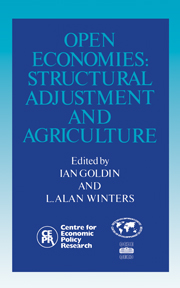Book contents
- Frontmatter
- Contents
- List of figures
- List of tables
- Preface
- Acknowledgements
- List of conference participants
- 1 Introduction: from macro to maize
- Part One Open economy analysis
- Part Two The small country assumption and trade reform
- 6 Exchange reforms, supply response, and inflation in Africa
- Discussion
- 7 Taxes versus quotas: the case of cocoa exports
- Discussion
- 8 Trade reform and the small country assumption
- Discussion
- Part Three Risk and adjustment
- Part Four Government's role
- Index
Discussion
from Part Two - The small country assumption and trade reform
Published online by Cambridge University Press: 04 August 2010
- Frontmatter
- Contents
- List of figures
- List of tables
- Preface
- Acknowledgements
- List of conference participants
- 1 Introduction: from macro to maize
- Part One Open economy analysis
- Part Two The small country assumption and trade reform
- 6 Exchange reforms, supply response, and inflation in Africa
- Discussion
- 7 Taxes versus quotas: the case of cocoa exports
- Discussion
- 8 Trade reform and the small country assumption
- Discussion
- Part Three Risk and adjustment
- Part Four Government's role
- Index
Summary
The authors of Chapter 8 address the problem of the ‘fallacy of composition’, which arises when trade expanding reforms which would be good for the individual country acting alone are undertaken by many countries. The result of the summed actions for many countries may be a decline in the terms of trade such that all the countries would be better off by not implementing the reforms. For the authors the export of tropical products from sub-Saharan Africa is the case in point; export tax agreements are examined as a possible answer to the fallacy of composition problem, and the results illustrated by output from the RUNS model.
The ‘fallacy of composition’ is an old idea. Nicholas Stern long ago expressed to me the fear that by encouraging small countries to treat border prices as constants, the Little-Mirrlees method might trap those who used it into neglecting the effect of the general application of the approach on the future time path of those prices. In the case which he had in mind, tea farming might look good in many small countries if one assumed a continuation of present tea prices which the expansion of tea farming would not support.
The authors note that the evidence from cross-section studies of a connection between trade-expanding structural adjustment and enhanced economic growth is far from unqualified, although the old ways of import substitution and inward-looking policy are so discredited in the developing countries that nowadays OECD countries could learn some lessons in trade liberalisation from their developing trade partners.
- Type
- Chapter
- Information
- Open EconomiesStructural Adjustment and Agriculture, pp. 197 - 200Publisher: Cambridge University PressPrint publication year: 1992



